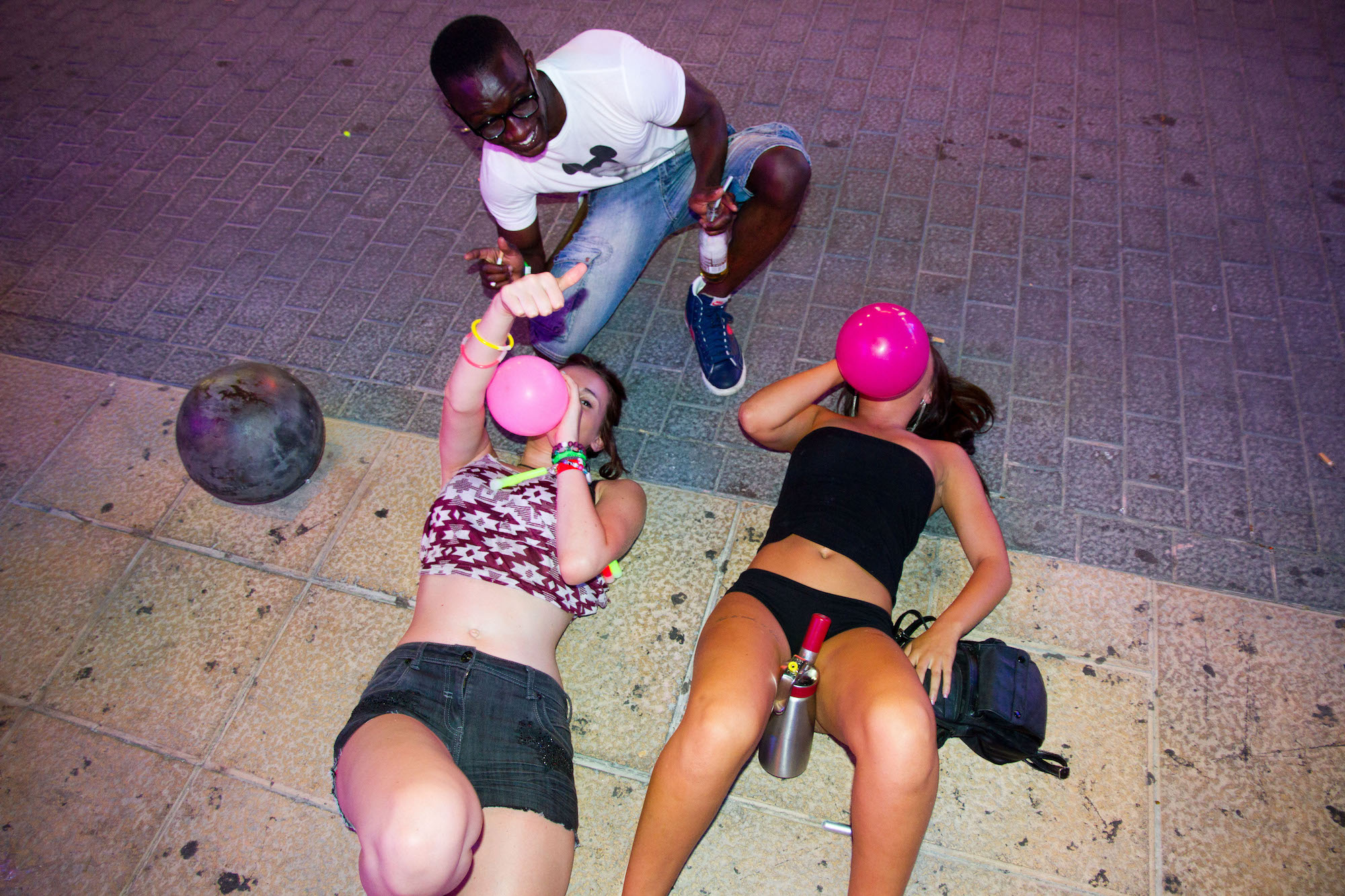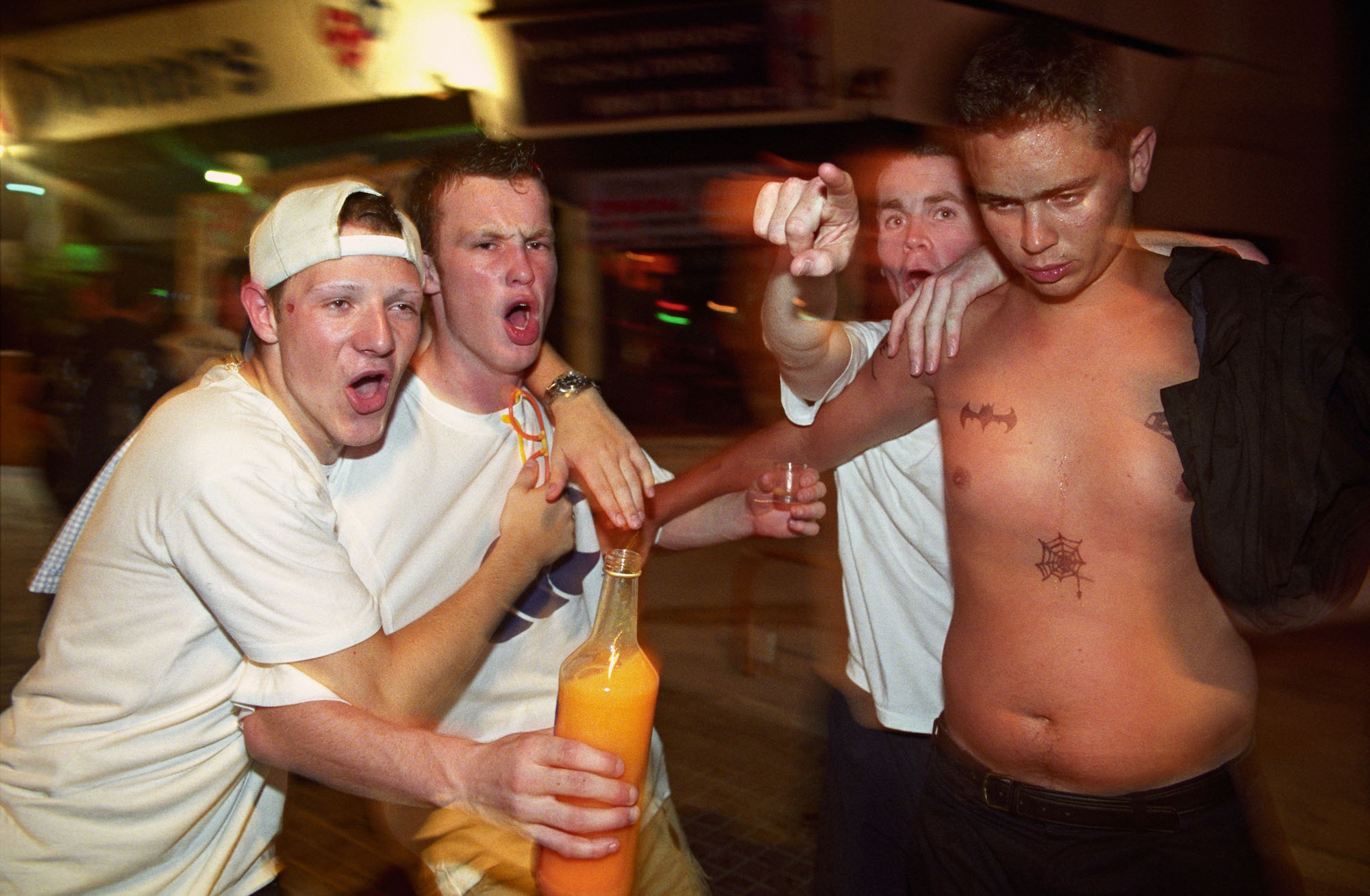“Jägerbombs and vodka shots and blow jobs and sweat down my balls,” is how Big Narstie describes the quintessential Club 18-30 experience on the brand’s YouTube channel.
Launched in 1968, Club 18-30 was a package holiday company that sent young, single, mostly working class Brits to sunny European destinations like Ibiza, Majorca and Ayia Napa. With their ethos of sun, sea and sex – immortalised in films such as Kevin & Perry Go Large and The Inbetweeners Movie – the Club 18-30 holiday was marketed as an almost necessary British coming-of-age experience, until the Thomas Cook-owned brand shut shop in 2018. Now, nearly a year since the last set of 18-30s holidaymakers travelled from Manchester to Magaluf, the memories are all that remain.
Videos by VICE
“18-30s were basically like a lads’ holiday on steroids,” remembers Manchester-based Callum, 26, who works in market research. With a friend from school, he went on an 18-30s holiday to Ayia Napa when he was 17. Preparation began months before: “I smashed bare sun beds before I went, and that was the only six months I’ve ever been a member of, or actually even consistently gone to, a gym,” he tells me. Alice, from Rochdale, who now lives in London and works in music PR, also went on an 18-30s holiday when she was 17, hitting Sunny Beach in Bulgaria with seven friends in 2015. “We all got our nails done, I got my first ever full body wax and a few of the girls got spray tans,” she remembers.
Upon arrival, groups of usually same-sex holidaymakers hit bars and clubs playing whatever was in the charts back home, escorted by overzealous holiday reps. “We’d be crammed into coaches drinking cheap shots of schnapps, and then taken to bars where we had to eat bananas out of men’s pants,” remembers Kate, 40, a teacher from Manchester, whose 18-30s holiday took place during the summer of 1996. Alice has similar tales: “You’d have to pass an orange to someone using your chin, or pop a balloon using someone’s balls.” The aim of all these games was for people to end up in bed together. As Callum puts it: “Wall-to-wall vagina is what I kept hearing all through that trip.”

Indeed, the height of Club 18-30’s popularity coincided with a newfound hedonism and sexual permissiveness, which first followed the Second Summer of Love, and then later the ascent of lad mags and ladette culture, ushering in a decade in which drinking copious amounts of alcohol was the height of cool. A 1995 Saatchi & Saatchi-designed campaign featured slogans such as “It’s not all sex, sex, sex. There’s a bit of sun and sea as well,” and, “Be up at the crack of Dawn… or Julie… or…”
An unprecedented number of people complained about the campaign. Three artists from Manchester found the advertising especially distasteful, dangerous and disrespectful to women, and launched a counter-campaign around the city that same year. The graffiti – which gave holidaymakers warnings such as “Aids is a life sentence” – foreshadowed a downward shift for the brand. The 2000s saw sordid tales of unwanted pregnancies, rape and deaths fill the pages of the tabloids as holidaymakers engaged in ever more outrageous and dangerous behaviour. And, as Alice tells me, the holidays were also starting to attract a different kind of crowd – older predatory men looking to have sex with naïve and inexperienced young women.
“We got put in a hotel with these lads who spent the whole holiday trying to sleep with our group,” she remembers. “They said they were 21, but when we got home we found out that they were all about 28 and 29, and most of them were married with kids.” Reps also got in on the action: “Our promoter had all the girls he’d ever slept with tattooed in a list on his arse, going all the way down his leg. He kept asking if I’d like to add my name.”
The downturn made for great TV. First came ITV’s Club Reps in 2002, while Channel 5 showed Curse of Club 18-30 in 2005 and the BBC aired Sun, Sex and Suspicious Parents from 2011 to 2015. With Thomas Cook’s profits falling, holiday reps were increasingly working on commission, and drinking-related activities were aggressively marketed. “They were relentless, trying to get every last penny out of you – real cowboy salesmen vibes,” says Callum, whose Club 18-30 holiday took place during the Thomas Cook profit crash summer of 2010. “You’d get a knock at the door, the reps would come into your room, proper pal you up and then try to sell you a package. It was like €200 for one beach party, one booze cruise and a couple of bar crawls. It was kind of like, ‘If you don’t buy this package, you’re missing out and you won’t do Napa properly.’”
While its ongoing troubles led Club 18-30 to try to rebrand by toning down, it just didn’t work – holidaymakers wanted exotic Instagrammable locations, not simply less booze in the same European resorts. Or so it seemed. According to Daniel Briggs‘ 2013 book Deviance and Risk on Holiday: An Ethnography of British Tourists in Ibiza, the Club 18-30 brand might have fallen out of favour, but what it did was kickstart a new type of holiday experience that’s only growing in popularity. Characterised by excessive consumption, it’s exemplary of the wider prevalence of what he describes as “extreme capitalism”.
As Briggs tells me now: “‘Play now, think later, responsibilities? Well, fuck that! we need to enjoy this moment right now because we’re not going to have it again’ This way of thinking, which comes as consequence of the breakdown of our communities, our traditions – and which is moulded by the commercial world – makes us feel like we need to have certain things or do certain things to feel we live a satisfying and fulfilling life.”
While Club 18-30 might be no more, extreme capitalism regenerates under a different guise, meaning excessive consumption continues and the party carries on.
Briggs, a researcher at the European University of Madrid, explains that what the Club 18-30 brand did was help to seed holidaymakers’ life-long habits, or what he describes as a “holiday career”, of repeating detrimental behaviours. “This initiation led by Club 18-30 often lays the foundations for many to either go back to the same place to do the same thing, or look for a different destination, similar in orientation – in that there is a beach, it’s hot and there is a zone dedicated to getting wasted – so that they can do the same thing,” he writes in the book.
When I ask Callum if he went on another Club 18-30 holiday, he says that he didn’t, but he did return to Ayia Napa with a similar agenda. “We didn’t sign up to anything, but still had great craic,” he says, admitting he “did over a grand in a week”. While he reckons he’s “grown out” of 18-30s-style trips, his “holiday career” continues because he’s still getting wasted. “I’ve progressed to the next level,” he says. “It’s now about getting spangled for four days in a field somewhere, at a festival listening to music.”
As Briggs describes in his book, these behavioural patterns have had devastating consequences for both holidaymakers and the fortunes of the resorts themselves, which don’t have the resources to deal with the accidents and crime that result from the curse of what’s come to be known as “Brits abroad”. But, he argues, the mainly outsider-owned bars and clubs don’t care about the negative effects of their operational practices, and the marketing strategies of Club 18-30 live on through festival brands such as Ibiza Rocks and nightclubs like Pacha and Amnesia. They too are similarly upselling with events such as pool and foam parties, and VIP areas, so that holidaymakers can momentarily feel like they’re “living the dream”, while parting with ever more cash.
Meanwhile, excessive consumption of alcohol has been replaced by excessive narcissism. “[The 18-30 party lifestyle is] starting to be boycotted by image maintenance,” Briggs tells me. Conducting further research In Benidorm recently, he says he “met guys who weren’t drinking because they were worried they’d get a beer gut. But what they’re not spending on alcohol, they’re spending on clothes and the aesthetic of the body – it’s no longer acceptable to go out in shorts and a T-shirt.” This too will become a never-ending cycle of repeating the same extreme capitalism-driven behaviours: “What will happen is, people will want to continue to look good and relive their younger years, and they will do that by going back to the same places and doing the same things,” he says.

Somewhat ironically, Briggs argues the disappearance of Club 18-30 – replaced by weekend trips, stag parties and music festivals, which people can afford in increasing frequency due to the ascent of budget airlines and AirBnB – might be a bad thing. “With a package holiday you’re there for a week and your consumption is exaggerated on the first and last night, but if you go for a weekend you amplify what you consume because you want to withdraw as much as possible from that short amount of time,” he explains. “Going independently, a lot of people don’t have insurance either. They go with the mindset of, ‘Well, it’s only a weekend, what can go wrong?’ So I do think that for all the debauchery that was promoted on 18-30s, behind it there was a well known company, which meant the reps were responsible for the tourists.”
If what Briggs argues is true – if holidaymakers are locked into the patterns of their “holiday career” thanks to what happens on their first trip – do Club 18-30 alumni regret choosing this as their maiden voyage?
“I regret nothing, it’s all an experience,” says Callum, while going as far as to say he misses the unique sense of camaraderie.
“In retrospect, I wish I hadn’t gone, but not because of the drinking – I’d have started drinking anyway,” says Kate, “but I feel like sex shouldn’t be one of the focal points of an organised holiday; it seems wrong and crass.” Alice says: “I didn’t do anything I regretted – just snogged a lot of inappropriate boys.”
What are the chances of Club 18-30 coming back, then? “People love anything nostalgic, so I think they might,” Alice tells me. She also points out that as far as her own 18-30s holiday goes, someone’s definitely got unfinished business: “That rep’s got another bum cheek to fill,” she laughs.




